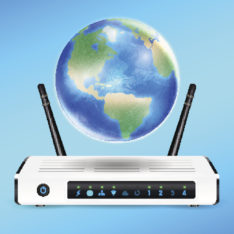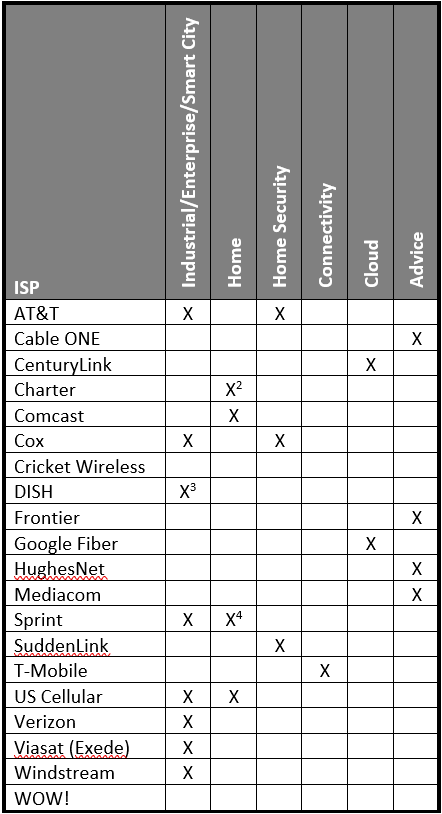
[From the last episode: Apple, Amazon, and Google all have smart-home offerings.]
There’s another group of prominent companies that may or may not get involved in the IoTThe Internet of Things. A broad term covering many different applications where "things" are interconnected through the internet.: the internet service providers (ISPs). From a home standpoint, these are the companies through which you get your internet access. And they have an advantage: the internet modemA piece of network equipment that converts data into a format that can be transmitted. Old modems sent the data on a phone line; modern cable modems send the data across a cable connection. It stands for "modulator/demodulator." that you already have might be able to serve as a hubA piece of electronic equipment that gathers separate related things together. A network hub, for instance, might bring together the individual network connections of multiple local users. A sensor hub brings together sensor data from multiple separate sensors for possible combination. Or, more specifically, a device in the home (or elsewhere) that acts as a central point connecting a variety of smart-home (or other) devices. The devices talk to the hub; the hub talks to the cloud..
In other words, an ISPA communications company that provides internet access to homes, phones, or companies. For consumers, this could be the cable company, a phone company offering DSL, or a cellular service provider. could add apps to that modem to help control smart-home devices. Or, in other cases, ISPs might be more interested in working with industrial companies on industrial IoT solutions. In fact, as I looked through the strategies that different companies had, six variations came up:
- Some will focus on industrial/enterprise applications
- A few are looking to the smart-home market
- Some are addressing homes, but only home securityRefers to whether or not IoT devices or data are protected from unauthorized viewers.
- Some are focusing on offering connectivityThis refers to some kind of electrical connection. It might be through a network cable, a cable connection, a wireless connection, or a phone - just to name some options. The connection might be to the internet or to some other local device., largely for industrial IoT applications.
- Some are taking on a cloud offering
- And some are simply offering themselves up as advisors on IoT stuff.
I went through a list of the largest ISPs in the US, and I’ve put what they each do in a table below, checking off how they’re addressing the IoT.
Is an ISP a Better IoT Provider?
So should you go to one of these guys instead of one of the Big 3 (or anyone else)? There’s no easy answer to that. One huge consideration is whether or not your ISP wants to play – in particular, in the home market.
For the most part, ISPs look like utilities (even though they don’t want to be considered utilities, since that changes the regulatory environment). You typically have one to three choices of ISP, and maybe less. The difference is usually the technology: one for cable, one for DSL (which comes over the phone lines), and one for satellite (if remote) or one for fiber (if not remote). Wireless is sometimes an option, although it’s hard to get the same speed.
The reason there isn’t usually more than one of any type is that these guys have to build out huge networksA collection of items like computers, printers, phones, and other electronic items that are connected together by switches and routers. A network allows the connected devices to talk to each other electronically. The internet is an example of an extremely large network. Your home network, if you have one, is an example of a small local network. to reach their customers. So it’s extremely expensive to start your own separate network to compete with these guys. And the big guys are really big, making it even harder to go head-to-head with them.
It Matters Where You LIve
You’ll have the most competition in dense, urban areas where you get more customers for a given investment. On the flipside, rural areas are often extremely poorly served – even by cellular signals. So choice is extremely limited there. All of which is why, depending on where you are, your ISP may look more or less like a utility.
That said, if they do a good job, there’s no reason not to use them. Bear in mind, however, that ISPs are different in different areas. So if you build a smart-home systemThis is a very generic term for any collection of components that, all together, can do something. Systems can be built from subsystems. Examples are your cell phone; your computer; the radio in your car; anything that seems like a "whole." using, say, Comcast, and you move someplace not served by Comcast, then you may or may not be able to use that smart-home system in your new home – depending on whether or not your new ISP will support the devices you have.
Also, the ISP market changes often – just like the non-ISP IoT market. Companies merge; companies change strategies; companies decide to enter or exit markets. For example, Time Warner was entering the home market, but then they were bought by Charter, and Charter seemed to be signaling that it might get out of that market. So, even if you don’t move, such corporate changes might still affect you. That said, there’s no real protection from that from any company — ISP or not, so there’s not necessarily an advantage or disadvantage vs. non-ISP offerings.
ISPs and Net Neutrality
This is also an area where net neutralityThe notion that an internet service provider needs to treat all traffic equally, without giving preferential treatment to traffic from specific companies. – or the lack thereof – may have a measurable impact. Let’s say that your ISP offers a smart-home service, but you decide to go with something else. Will your ISP punish you by slowing down or blocking the competition you chose?
Let me be clear here: I have heard of no instances of that happening by anyone. In fact, most concerns about what the lack of net neutrality might bring about have yet to play out. So we’re talking here about what might be possible should an ISP decide to do so. They may not.
The idea isn’t to scare you here, but rather to make sure you take this into account when making your choices.
ISP Offerings1
(Click to enlarge)
Notes:
- This list likely to change over time as companies merge and strategies change. It should be current as of date posted.
- Exiting?
- Parking, via Parkifi acquisition
- Home served through Vivint


Leave a Reply